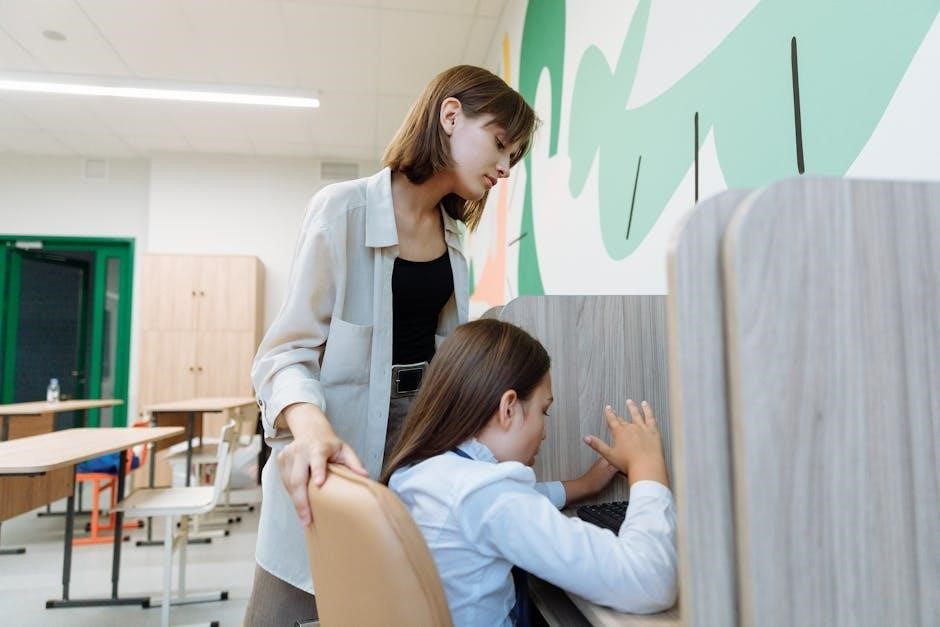Overview of the Role of an Instructional Assistant in Special Education
An instructional assistant in special education supports teachers by handling administrative tasks, assisting students with special needs, and helping with lesson preparation and implementation.
1.1 Definition and Importance
An instructional assistant in special education is a vital support role that assists teachers in creating an inclusive learning environment. They provide essential help with both administrative and educational tasks, ensuring students with special needs receive tailored support. Their role is crucial for fostering student growth, enabling personalized instruction, and enhancing overall educational outcomes in special education settings.
1.2 Key Responsibilities and Impact
Instructional assistants play a pivotal role by supporting teachers, preparing materials, and aiding students individually or in small groups. Their efforts ensure personalized learning, helping students meet academic and behavioral goals. By fostering a structured and supportive environment, they directly contribute to student progress and the overall effectiveness of special education programs, making a lasting impact on student success and development.
Core Duties of a Special Education Instructional Assistant
Instructional assistants provide essential support by assisting teachers, preparing materials, and aiding students, ensuring educational and administrative tasks are efficiently managed to promote learning and student well-being.
2.1 Administrative Support
Instructional assistants handle clerical tasks like attendance tracking, preparing materials, and organizing documents. They also assist with classroom setup, manage supplies, and support teachers in maintaining an efficient learning environment. These duties ensure smooth daily operations, allowing educators to focus on instruction and student interaction. Administrative support is crucial for effective classroom management.
2.2 Instructional Support
Instructional assistants provide direct support to students and teachers during lessons. They work with individual students or small groups, reinforcing concepts, assisting with reading, and helping with note-taking. Assistants also prepare and modify instructional materials, ensuring they meet students’ needs. This role enhances learning experiences by providing personalized attention and enabling teachers to focus on instruction effectively.
Supporting Students with Special Needs
Instructional assistants provide tailored support to students with special needs, assisting with learning activities, behavior management, and daily tasks to promote academic and personal development.
3.1 Working with Individual Students
Instructional assistants provide one-on-one support to students, assisting with tasks like reading, highlighting texts, and reinforcing concepts. They help students with unique learning needs, offering tailored guidance during lessons and activities. This individualized attention helps students focus, understand material, and build confidence in their abilities, ensuring they meet their educational and personal goals effectively.
3.2 Assisting Small Groups
Instructional assistants facilitate learning in small group settings, guiding students through interactive activities and exercises. They reinforce teacher-led lessons, provide additional instruction, and ensure students understand concepts. This collaborative approach allows for personalized attention, fostering engagement and teamwork, while helping students achieve their academic and social goals in a supportive environment.
Collaboration with Teachers and Other Professionals
Instructional assistants work closely with teachers and professionals to support student needs, ensuring coordinated efforts in education and care through effective communication and teamwork.
4.1 Communication and Teamwork
Effective communication and teamwork are essential for instructional assistants, ensuring seamless collaboration with teachers and professionals. They assist with lessons, reinforce concepts, and help manage student behavior, fostering a supportive environment. By maintaining open dialogue and coordinating efforts, they ensure students receive consistent guidance and care, tailored to their unique needs and goals.
4.2 Implementing Lesson Plans
Instructional assistants play a vital role in implementing lesson plans tailored for students with special needs. They assist teachers in modifying materials, conducting exercises, and reinforcing concepts. By helping with activities like reading tests or note-taking, they ensure students grasp the curriculum. Their support enhances the educational experience, making learning accessible and engaging for all students in the classroom setting.
Classroom Management and Safety
Instructional assistants help maintain classroom order and ensure student safety by observing behavior, resolving conflicts, and creating a structured learning environment for all students.
5.1 Maintaining Order in the Classroom
Instructional assistants monitor student behavior, support smooth transitions, and encourage positive conduct to maintain a structured and respectful learning environment, ensuring all students can focus effectively.
5.2 Ensuring Student Safety
Instructional assistants monitor students to prevent accidents, ensure adherence to safety protocols, and assist in emergencies, creating a secure environment that allows students to focus on learning and development.
Preparation and Organization of Instructional Materials
Instructional assistants prepare and organize materials, modify resources for accessibility, and create visual aids to support lesson plans, ensuring a structured and inclusive learning environment.
6.1 Developing and Modifying Materials
Instructional assistants develop and modify educational materials to meet diverse student needs, creating visual aids, adapting curriculum resources, and preparing tailored learning tools to enhance accessibility and engagement for special education students, ensuring materials align with lesson goals and support individualized learning plans effectively.
6.2 Organizing the Learning Environment
Instructional assistants organize the classroom to create a structured, safe environment, arranging materials, setting up workstations, and maintaining order. They ensure accessibility for students with special needs, promoting focus and engagement, and adapt spaces to accommodate diverse learning requirements, fostering an inclusive and efficient learning atmosphere tailored to individual student needs and instructional goals.

Documentation and Record-Keeping
Instructional assistants maintain accurate records of student progress, prepare reports, and document behaviors to support teaching decisions and ensure legal compliance, while safeguarding confidentiality.
7.1 Tracking Student Progress
Instructional assistants monitor and document student progress, noting achievements and challenges. They assist in assessing learning outcomes, track behavioral developments, and provide feedback to teachers. This involves maintaining detailed records, updating progress reports, and ensuring data accuracy. By closely observing students, they help identify areas needing extra support, enabling personalized interventions and adjustments to individualized education plans (IEPs) for optimal student success.
7.2 Maintaining Accurate Records
Maintaining accurate records is crucial for tracking student progress and ensuring compliance with educational standards. Instructional assistants manage detailed documentation, including attendance, progress reports, and student data. They ensure records are precise, up-to-date, and securely stored. Accurate record-keeping aids teachers in assessing performance and making informed decisions, supporting the overall efficiency of special education programs and fostering student success effectively.
Additional Responsibilities and Duties
Instructional assistants may support special education programs, adapt materials, and assist with community integration or extracurricular activities, ensuring comprehensive student support beyond core classroom tasks.
8.1 Supporting Special Education Programs
Instructional assistants play a crucial role in supporting special education programs by assisting with program implementation, adapting materials, and providing individualized support to students. They help maintain structured environments, facilitate learning activities, and ensure students receive tailored attention. This support enables teachers to deliver effective instruction and promote student progress in specialized settings.
8.2 Adapting to Student Needs
Instructional assistants adapt to diverse student needs by modifying instructional materials, providing individualized support, and assisting with behavior management. They collaborate with teachers to adjust strategies, ensuring each student’s unique requirements are met. This flexibility enables tailored interventions, fostering an inclusive and effective learning environment for students with varying abilities and challenges.

Professional Development and Training
Instructional assistants engage in ongoing education and workshops to enhance their skills, ensuring they stay updated on best practices in special education support and strategies.
9.1 Ongoing Education and Workshops
Instructional assistants participate in workshops and training programs to enhance their skills in supporting students with special needs. These sessions cover updated teaching strategies, behavioral management techniques, and legal requirements. Continuous professional development ensures they remain effective in assisting teachers and providing individualized student support. Workshops often focus on adaptive technologies, communication methods, and collaborative teamwork to improve educational outcomes for students.
9.2 Staying Updated on Best Practices
Instructional assistants stay informed about best practices through professional development, workshops, and online resources. They learn new teaching strategies, technology tools, and behavior management techniques to better support students. By staying current, they adapt to evolving educational needs, ensuring effective support for diverse learners and maintaining a high standard of special education assistance.

The Impact of Instructional Assistants on Student Outcomes
Instructional assistants positively influence student outcomes by providing personalized support, enhancing learning experiences, and fostering confidence in special education settings.
10.1 Enhancing Learning Experiences
Instructional assistants enhance learning experiences by providing tailored support, assisting with individualized instruction, and helping students engage actively in educational activities. This personalized attention fosters a more inclusive and effective learning environment, enabling students with special needs to achieve their academic and developmental goals more successfully.
10.2 Building Student Confidence
Instructional assistants play a crucial role in building student confidence by providing positive reinforcement, individualized support, and encouraging participation. Their presence helps students feel secure, fostering self-esteem and resilience, which are essential for academic and personal growth. This support enables students to overcome challenges and develop a stronger belief in their abilities.

Career Path and Advancement Opportunities
Instructional assistants can advance to lead roles, specialize in specific disabilities, or pursue teaching certifications, offering opportunities for professional growth and increased responsibility in special education.
11.1 Growth Within the Field
Instructional assistants in special education can grow by gaining experience, specializing in specific disabilities, or taking on leadership roles. They may also pursue additional certifications or professional development opportunities, such as becoming a lead assistant or transitioning into related fields like behavioral therapy or educational consulting. This growth often leads to increased responsibilities and expertise in supporting diverse student needs effectively.
11.2 Transitioning to Teaching Roles
Instructional assistants in special education often use their experience as a stepping stone to become teachers. Many pursue further education and certifications to transition into teaching roles, leveraging their hands-on experience with diverse student needs. This pathway allows them to apply their expertise in creating inclusive learning environments and supporting students with special needs effectively in a lead educator capacity.
The role of instructional assistants in special education is crucial and evolving, with increasing demand for skilled support staff to enhance student outcomes and classroom success.
12.1 The Evolving Role of Instructional Assistants
The role of instructional assistants in special education is expanding to meet the growing needs of students with diverse abilities. With advancements in educational strategies and technologies, assistants are now more involved in personalized learning plans, behavioral support, and integrating assistive technologies. Their responsibilities are becoming more specialized, requiring ongoing professional development to stay effective in a dynamic educational landscape.
12.2 The Importance of Special Education Support Staff
Special education support staff play a vital role in ensuring students with special needs receive personalized attention and effective learning experiences. Their contributions enhance academic and emotional growth, fostering an inclusive educational environment.
By providing tailored support, instructional assistants enable teachers to focus on lesson delivery, creating a collaborative and adaptive learning space that addresses diverse student needs and promotes overall educational success.
